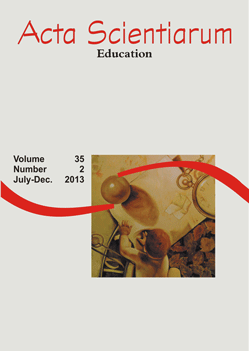<b>João Ribeiro’s compendium <i>History of Brazil</i>: an analysis from the perspective of didactic organization</b> - 10.4025/actascieduc.v35i2.20340
Abstract
Current paper analyzes an important teaching instrument, at university level, produced during the First Brazilian Republic, called History of Brazil (1900) by João Ribeiro, a professor at the Pedro II College. The functions undertaken by the compendium within educational relationships and through the characteristics of its didactic contents are discussed. The Triple Alliance War (1864-1870) theme is chosen as an example. Scholars on João Ribeiro and his works acknowledge the originality of his theses and the renewal he brought about in Historiographical studies and in Didactics. Although his concepts on history are innovatory, the validity of his ideas on Didactic should be questioned. Results show the compendium failed to surpass the previous ones with regard to objectification and simplification of the teaching task.
Downloads

This work is licensed under a Creative Commons Attribution 4.0 International License.
DECLARATION OF ORIGINALITY AND COPYRIGHTS
I declare that this article is original and has not been submitted for publication in any other national or international journal, either in part or in its entirety.
The copyright belongs exclusively to the authors. The licensing rights used by the journal are the Creative Commons Attribution 4.0 (CC BY 4.0) license: sharing (copying and distributing the material in any medium or format) and adaptation (remixing, transforming, and building upon the material thus licensed for any purpose, including commercial purposes) are permitted.
It is recommended that you read this link for more information on the subject: providing credits and references correctly, among other crucial details for the proper use of the licensed material.














































